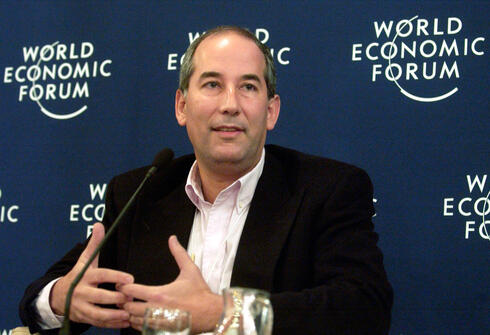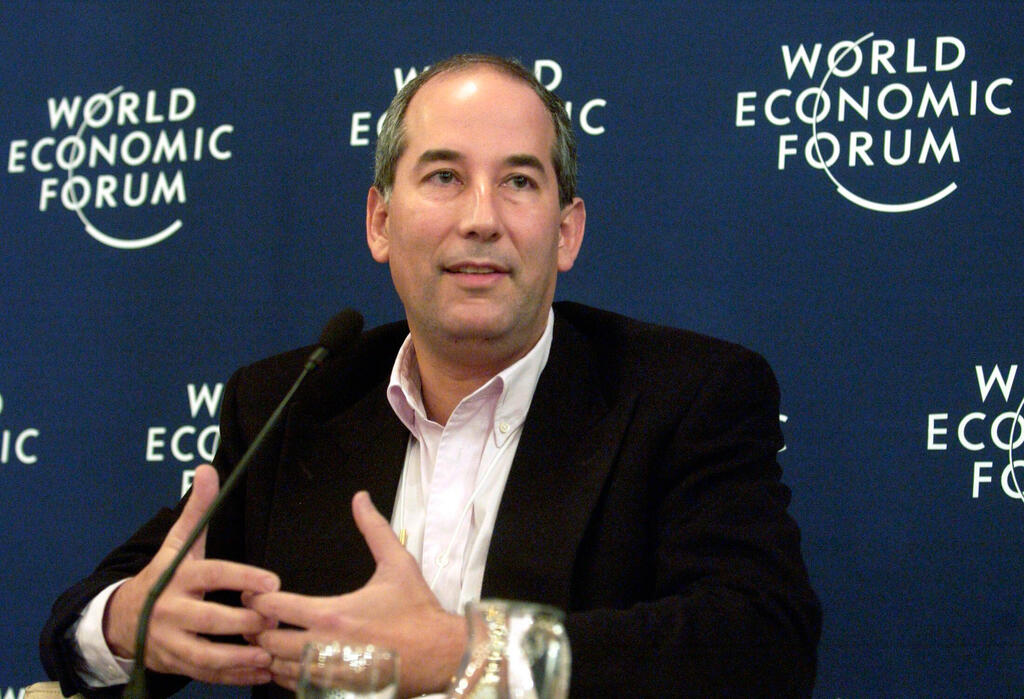
ISRAEL AT WAR
Former Reuters CEO: After Israel's soldiers return from reserves, they will establish amazing companies
Tom Glocer ran Reuters for 10 years and today is an active high-tech investor and sits on the boards of leading companies. He believes that the perception of Israel as invincible must be restored, and predicts the current war will give a boost to a new generation of start-ups.
Tom Glocer, as someone who headed the Reuters news agency for ten years, what does Israel not understand about the international media? Even a journalistic institution like The New York Times immediately adopts Hamas' narrative as we saw during the Gaza hospital incident last week, which they have since apologized for.
"I think a lot about this issue. There is indeed a public relations challenge on Israel's part, but I feel that its something deeper. Israel was everyone's darling when it was seen as David standing against Goliath, as it was in 1948, 1967 and also in 1973. Each time it was attacked and stood up successfully against all odds. The October 7th attack is fundamentally different because Israel is seen as a very strong country today - it is no longer "David." Not that there's anything wrong with that, on the contrary, but that is the reality.
"After all, who wants to change the narrative? Israel is the last one looking to kill 500 people in Gaza now that everyone is on its side. And not only the United States, which is obvious, but even France and Britain, which have large Arab populations, and whose governments may pay a price of their support for Israel."
What can and should Israel do to change perceptions and attitudes towards it?
"Now is a time of war and perceptions will develop mainly according to the depth of harm to civilians. The time to change perception and public opinion was throughout the last twenty years, but Israel has been busy abandoning the two-state solution and building settlements. I have already expressed my opinion on the current government on my blog, and the way to change the global public opinion on Israel is via internal political change. We need to get the peace initiative back on track, but I'm afraid it will take at least ten years."
Glocer (64) is one of the top businessmen in the United States, he is Jewish and has quite a few family members who live in Israel. Since retiring from the management of Reuters in 2011, he has served on a number of prestigious boards, including investment bank Morgan Stanley, pharmaceutical giant Merck and international advertising group Publicis. At the same time, he has invested in more than a hundred high-tech companies through two funds, and was a partner in establishing, and now chairman of, Israeli fintech unicorn Capitolis and cyber unicorn BlueVoyant, which has a large development center in Israel.
Capitolis, which he founded together with the serial entrepreneur Gil Mandelzis, who previously sold Traiana for a quarter of a billion dollars, was valued at $1.6 billion in its last funding round at the beginning of 2022. However, a year ago it fired a quarter of its employees due to a slowdown in growth, and was left with about 120 employees. Capitolis has developed a platform that allows financial institutions to collaborate with each other to facilitate compliance with the regulator's capital freeze requirements.
What do you think will happen to Israeli hi-tech? How deep will the damage be to the company's business?
"Today, in the Israeli companies in which I am invested, about 10% of employees on average are recruited for reserve service, and the 90% who remain have a connection to one of the murdered, kidnapped or wounded, and they are immersed in it, of course. This is an existential moment in which no one thinks about closing another round of funding or on the profit line, and it's natural that it's not in the priorities right now. I'm also assuming that there will be quite a few employees who won't be able to function for a few months, especially those who live along the Gaza border.
"There will be damage to income and perhaps expenses will be higher. Companies that were already weak may fall, but most will recover. Finance people have an image of being ruthless, but no one will turn off the faucet under the existing circumstances. I personally know a company that planned to fire 10% of its employees, and has now decided not to touch the Israeli employees, while the rest of its employees around the world were fired as planned. I don't think the generosity will last for years, but there will be considerations."
Will it be possible to restore investors' confidence and make them come back?
"I know that I will invest. I know that the feeling that Israel is invincible has been damaged here and needs to be restored. But I believe that the new Israel that will be created after the current crisis will be more restrained in certain areas and more integrated into the regional system. Regional stability may be better than living on deterrence and relying on electronic fences.”
Do you think that only Jewish investors will remain with Israel? Will investment in local high-tech return to be more similar to what it was twenty years ago - a combination of philanthropy and business?
"Ultimately, the greed, that famous Wall Street greed, wins. In addition to the fact that today there are many Israeli venture capital funds, there are also many investors who have made a lot of money from investments in Israeli companies. The number of billion-dollar exits in Israeli companies is unprecedented, so as long as the Israeli ecosystem continues to function and remains as it is, the investments will continue."
At least militarily, the technology failed and did not deliver the goods. How do you think this will affect the Startup Nation and the desire to establish new companies here?
"Times of war give a boost to new technologies. Certainly in Israel quite a few of its most famous successes came out of the battlefield. Things that might have been experimental up until now have become operational, and this gives a boost to a new generation of start-ups. Israel is especially known for establishing companies based on military technologies. After the soldiers return from the reserves, within five years they will establish amazing companies based on current events."
As someone who sits on the boards of major companies in the global economy, from Morgan Stanley to Merck, what is the atmosphere like there? How much is devoted to the war in Israel and the impact on the global economy?
"There are definitely discussions because Israel has influence in many, many arenas. At Merck, for example, the Israeli health system plays an important role in clinical trials of drugs under development. But mainly there is a general concern for employees in Israel, not for performance. The bigger and broader question that preoccupies businessmen and analysts today is what will be the impact on China? Will it decide that this is its moment to go after Taiwan when the whole world is busy not only with Ukraine, but now also with Israel."
As someone who knows President Biden personally, does the unprecedented involvement of the U.S. in the war in Israel stem from a real fear for the fate of Israel?
"I have met President Biden several times and he really cares about Israel. There are always fears of World War III in the background, so many world leaders have mobilized to warn Iran against intervention. I have never liked how contact with Iran is managed, but I think they are in no rush to endanger Hezbollah because that's their line of defense against American nuclear weapons."
After the shattering of the dream of a new Middle East and peace with Saudi Arabia that seemed within reach, are we now closer to World War III?
"I'm a businessman, so I'm an optimist with a touch of realism. The current situation ultimately opens the way to peace, but it will be difficult.
When are you coming back to Israel? Has your opinion about visiting here changed in light of the events?
"I wrote a new post last week following the events," Glocer said, referring to the post in which he called for the destruction of Hamas and the establishment of another government in Gaza. At the same time, he pointed out that Israeli democracy is still functioning, so it will also be able to establish an independent commission of inquiry.
"I never said I would stop investing in my companies," Glocer emphasizes and adds: "In the last two weeks I have contributed to a variety of causes for Israel. I think the reforms have died, and the reason I had for not visiting here has disappeared. Israel for me is the shining star of democracy in the Middle East.














